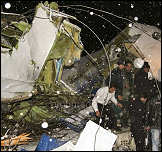 Nothing much of interest at the Sanctions breakout yesterday during the 2011 Update conference held by the Bureau of Industry and Security. The panel members included two people from the Office of Foreign Assets Control (“OFAC”) who went over some aspects of the new Libya sanctions and who conceded, during the Q&A session, that all the work on these new sanctions had slowed down their processing of licenses to Iran for food, medicine and medical devices. (Those exports are permitted under the Trade Sanctions Reform and Export Enhancement Act of 2000, commonly known as TSRA.)
Nothing much of interest at the Sanctions breakout yesterday during the 2011 Update conference held by the Bureau of Industry and Security. The panel members included two people from the Office of Foreign Assets Control (“OFAC”) who went over some aspects of the new Libya sanctions and who conceded, during the Q&A session, that all the work on these new sanctions had slowed down their processing of licenses to Iran for food, medicine and medical devices. (Those exports are permitted under the Trade Sanctions Reform and Export Enhancement Act of 2000, commonly known as TSRA.)
The real jaw-dropper came from panel member John-Marshall Klein, Foreign Affairs Officer, Office of Terrorism Finance and Economics Sanctions Policy, at the State Department. In discussing the recent sanctions on Iran Air, he noted that these sanctions did not preclude travel on Iran Air due to the provisions of 50 U.S.C. § 1702(b)(4) added by the Berman Amendment. But Mr. Klein didn’t stop there. He went on to say that he wouldn’t advise Americans to travel now on Iran Air because the sanctions would prevent Iran Air from getting spare parts.
Because Iran Air is now designated under the Weapons of Mass Destruction Proliferators Regulations, this means that the provision in section 560.528 of the Iranian Transaction Regulations which permits OFAC to license on a case-by-case basis spare parts necessary for the safety of civil aviation would not be strictly applicable. But that is not an exception made by OFAC out of the goodness of its own heart; that exception is required by the United States’s adherence to the Convention on International Civil Aviation, article 44 of which would prohibit the United States from taking actions that endanger civil aviation. And there is nothing that would prohibit a case-by-case licensing policy under the WMD proliferation regulations in cases of parts needed to promote the safety of civil aviation.
What Mr. Klein is saying is that it’s now the policy of the United States to use the sanctions against Iran Air in a way that will endanger the safety of its aircraft and its passengers. Even if true, and even if consistent with the United States’s treaty obligations, is this something that the U.S. government should openly admit? It can only be hoped that Mr. Klein was wrong.
 Permalink
Permalink
Copyright © 2011 Clif Burns. All Rights Reserved.
(No republication, syndication or use permitted without my consent.)

 Posted by
Posted by  Category:
Category: 

